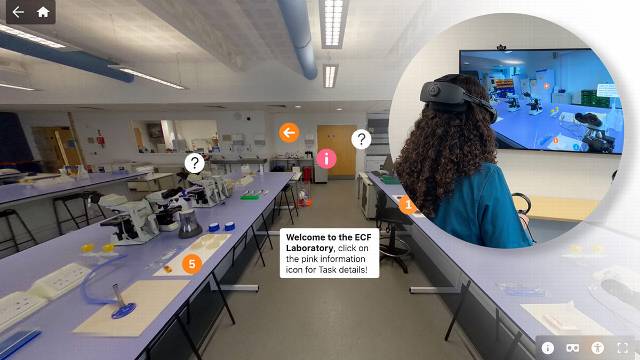
Today marks the start of Water Saving Week in recognition of the ways we have become, and continue to be, more sustainable in our water use. As a leading specialist university in agriculture and related studies, water plays a big part in the processes between field and fork; learning ways to be sustainable and efficient with water is key to environmental land management and farming processes more widely.
Dr Lucy Crockford, Senior Lecturer in Soil and Water Management, spoke to us about the different ways our students learn about water saving across degree courses in support of the agricultural and wider environmental industry. She explained: “From an agricultural point of view, the water saving I teach is at the very start of the process. Due to this, there are two key aspects to saving water on farms that can be applied to environmental land management more widely.
“Firstly, there is the conservation of water. It is possible to store water on farms through the soil; by improving the organic matter content in the soil, water retention can be improved, allowing for uptake of water by plants during periods of low water provision.”
Contextualising this, Dr Crockford said: “For the last two summers we have had droughts, leading to reduced availability of water for crops. Those farms that had improved their soil structure reported a lower requirement for irrigation compared to other farms with perhaps more compacted soils and poorer soil structure where water was not retained as effectively.”
Dr Crockford then shared the second way farms can save more water. She commented: “The other aspect to water saving is in trying to get farms to store water in a more managed way through their infrastructure. This may be introducing areas of wetlands or other natural provisions of water, storing for later irrigation.
“At Harper, we have a lagoon fed by a borehole that we use for irrigation. However, this is a groundwater source, naturally created, that can only store so much water. It is highly reliant on recharge through the winter when rainfall percolates to groundwater. Farmers are likely to need further provisions that come from implementing additional infrastructure.”
To become more sustainable and save water, there are a number of methods farmers can implement. Dr Crockford explained: “Ideally, farmers should be adding to water storage. Ponds are an excellent way to do this, self-filling over the winter so in the summer there is plenty of water available to transfer onto local fields. Balancing this with irrigation of soil and natural water sources provides farmland with effective long-term sources of water.”
Alongside this, there are wider ways to save water, as taught on the BSc (Hons) Environmental Land Management degree course. Dr Crockford gave an example: “I work with water companies, looking at the cleanliness of their water. Some water will have traces of metaldehyde, a pesticide from slug pellets.
“The issue is when you have a high amount of metaldehyde in the water, the way it is usually treated is by diluting with clean water. Consequently, we're using lots of clean water to try to dilute the water coming off the land and make it drinkable. This is using lots of water where, if less metaldehyde was used, we wouldn't use excess amounts of water to clean it and therefore saving more water overall. Ferric phosphate is now being used instead of metaldehyde to help reduce water use.”
With so many ways to save water in agriculture, it is hoped the water waste will become less of a pressing problem in the future. Should you be interested in learning more about water with us at Harper Adams, you can see our environment degree courses here as well as the BSc (Hons) Geospatial Sciences degree apprenticeship course to learn a range of skills that will help create a sustainable future.

 Blog: Veterinary Medicine students step into immersive 360° laboratory
At Harper & Keele Veterinary School, students are stepping beyond the traditional microbiology bench and into an immersive 360° labo …
Posted
Yesterday
Blog: Veterinary Medicine students step into immersive 360° laboratory
At Harper & Keele Veterinary School, students are stepping beyond the traditional microbiology bench and into an immersive 360° labo …
Posted
Yesterday






